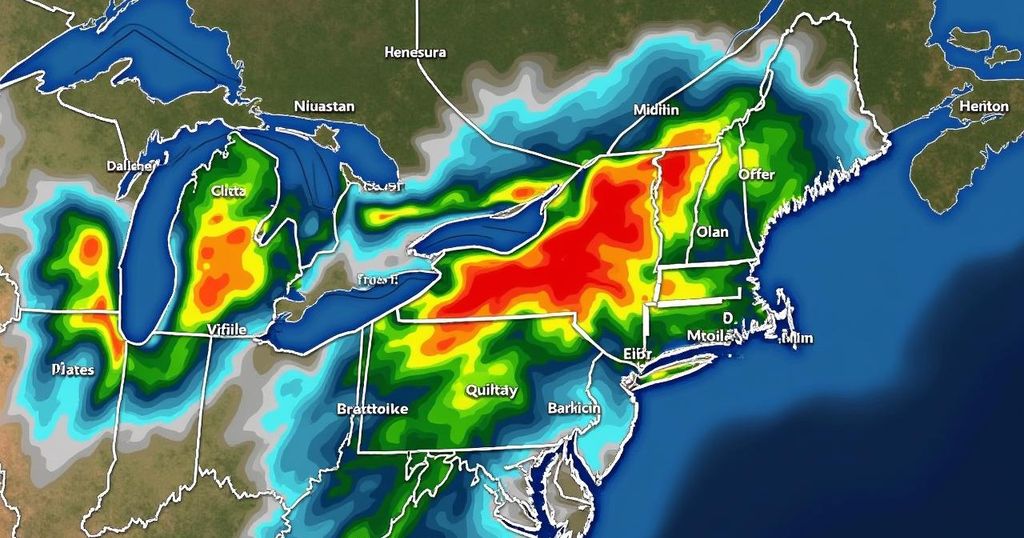The Impact of Climate Change on Hurricane Intensity: Insights from Hurricanes Helene and Milton
A recent study highlights that human-caused climate change has intensified Hurricane Helene, increasing its rainfall by 10% and wind speeds by 11%, paralleling concerns regarding the forthcoming Hurricane Milton. Continued fossil fuel consumption is projected to worsen hurricane impacts, leading to unprecedented inland flooding as experienced during Helene. Experts emphasize the urgent need for improved emergency preparedness and climate action.
Recent studies have demonstrated that human-induced climate change significantly contributed to the devastation caused by Hurricane Helene, increasing its rainfall by approximately 10% and intensifying its winds by about 11%. This analysis coincides with the emergence of Hurricane Milton, which is currently threatening the Florida coast. The elevated temperatures in the oceans, particularly in the Gulf of Mexico, have made conditions that exacerbate storm activity approximately 200 to 500 times more likely. Ben Clarke, a climate researcher at Imperial College London, noted, “Hurricane Helene and the storms that were happening in the region anyway have all been amplified by the fact that the air is warmer and can hold more moisture, which meant that the rainfall totals — which, even without climate change, would have been incredibly high given the circumstances — were even higher.” The predictions suggest that Hurricane Milton may similarly experience the effects of climate change. A pattern of increasing hurricane severity is apparent, with experts indicating that the continued reliance on fossil fuels will lead to even more powerful hurricanes, creating the potential for catastrophic flooding far from coastal areas. In fact, many of the fatalities from Hurricane Helene were the result of significant inland flooding rather than high winds. Hurricane Helene made landfall with unprecedented storm surges and sustained wind speeds of up to 140 miles per hour, resulting in widespread destruction across several states including Florida, Georgia, and the Carolinas. It is noted as the deadliest hurricane in the U.S. since Katrina in 2005, with more than 230 reported fatalities. Further assessments indicate that the rainfall caused by Helene would have been drastically reduced had climate change not been a factor, with one study estimating that climate change has rendered heavy rainfall in affected areas approximately 20 times more likely. Kim Cobb, director of the Institute at Brown for Environment and Society, emphasized that while uncertainties regarding the exact impacts of climate change remain, it is evident that it intensifies storms like Helene. She urged for improved emergency preparedness and resilience planning, stressing the need for reduced reliance on fossil fuels. Clarke reiterated that the trajectory of storm intensity is still influenced by human actions regarding energy consumption. The implications of these studies are profound, as they highlight the urgent need for action to mitigate climate change and reduce the risks associated with future hurricanes.
The alarming increase in hurricane intensity and impact has been significantly linked to climate change. As temperatures rise globally, the capacity of the atmosphere to retain moisture increases, which leads to more severe weather patterns. The phenomenon is particularly relevant for hurricanes, which are fueled by warmer ocean waters. Recent hurricanes, particularly Helene and Milton, serve as case studies demonstrating how climate change exacerbates these natural disasters, making them more potent and deadly. The World Weather Attribution initiative has been instrumental in assessing the connection between climate change and extreme weather events. Their studies utilize climate models and historical data to estimate the degree to which human activity impacts such events. The urgency of the situation has led to calls for immediate action to reduce carbon emissions and transition towards sustainable energy sources.
In summary, the evidence establishes a clear link between human-induced climate change and the increased severity of hurricanes, as exemplified by Hurricanes Helene and Milton. The rise in ocean temperatures due to climate change elevates the likelihood and intensity of such storms, resulting in significant rainfall and flooding that devastate communities. Experts caution that without substantial changes in energy consumption and a reduction in fossil fuel dependency, future hurricanes may become even more catastrophic. As demonstrated by the findings, proactive measures are essential to mitigate these risks and protect vulnerable populations.
Original Source: www.siouxlandproud.com




Post Comment